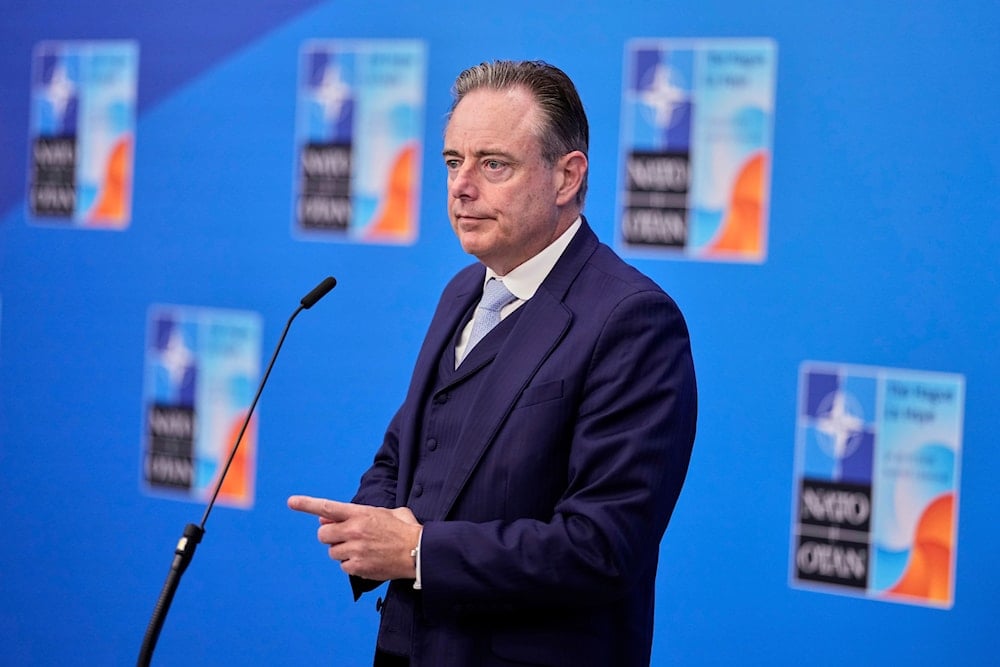Belgium raises legal hurdles to EU’s use of frozen Russian assets
Belgian Prime Minister Bart de Wever warns that the EU’s proposal to fund Ukraine with profits from frozen Russian assets is a "big gamble".
-

Belgium's Prime Minister Bart De Wever speaks with the media as he arrives for the NATO summit in The Hague, Netherlands, Wednesday, June 25, 2025 (AP)
Belgium has pushed back against a European Union (EU) proposal to raise funding for Ukraine by tapping profits from frozen Russian central bank assets, warning of serious legal and financial risks.
Prime Minister Bart De Wever described the plan as a “big gamble” requiring “ironclad guarantees” and proportional risk-sharing among EU member states.
“Every country will have to guarantee proportionally in the case that this goes wrong,” De Wever told reporters Thursday on the sidelines of a European Political Community summit in Copenhagen. He cautioned that the mechanism could drag out for months, urging the EU to explore alternative sources of financing for Kiev.
Read more: Macron: Seizing frozen Russian assets would break international law
EU’s frozen asset blueprint
The European Commission has been seeking to unlock billions of euros from roughly €185 billion ($217 billion) in Russian central bank assets immobilized at Euroclear, the Brussels-based clearing house. Under the plan, the EU would not seize the assets themselves but rather channel profits generated from them into a funding mechanism for Ukraine.
Commission President Ursula von der Leyen said the proposal would ensure the financial burden fell on “broader shoulders", emphasizing that about €140 billion could become available in stages. The funds would then be transferred to Ukraine in tranches with certain conditions attached.
To address concerns from cautious member states, the EU suggested a “tailored debt contract” with Euroclear at a 0% interest rate, intended to provide protection in the event of future Russian claims.
Read more: G7 leaders allocate $50bln to Ukraine from frozen Russian assets
Belgium’s key role, concerns
Belgium’s resistance carries weight because the bulk of the frozen Russian sovereign assets, estimated at over €185 billion, are located within its jurisdiction at Euroclear. Belgian officials have repeatedly highlighted that sovereign assets such as central bank reserves enjoy a high degree of legal immunity under international law.
De Wever insisted that legal uncertainties remain unresolved and warned of reputational damage to Belgium’s financial system should Euroclear be embroiled in costly lawsuits. “There’s no such thing as free money,” he remarked, underlining fears that Belgium could end up disproportionately exposed if the EU-wide guarantees prove insufficient.
Read more: EU mulls curbing Russian oil pipeline supplies to Hungary, Slovakia
Wider EU debate ahead of summit
Despite Belgium’s objections, other European leaders have expressed optimism about finalizing the plan before the upcoming EU summit at the end of October. They argue that the urgency of financing Ukraine, amid mounting costs of the war, outweighs potential risks.
Belgium, however, continues to stress the need for collective responsibility and legal clarity. “We are a club with the richest countries of the world, saying that it is impossible to raise that money,” De Wever said, hinting that alternative financing mechanisms should not be ruled out.
Read more: EU declares largest global Ukraine support package of $200 billion

 3 Min Read
3 Min Read









